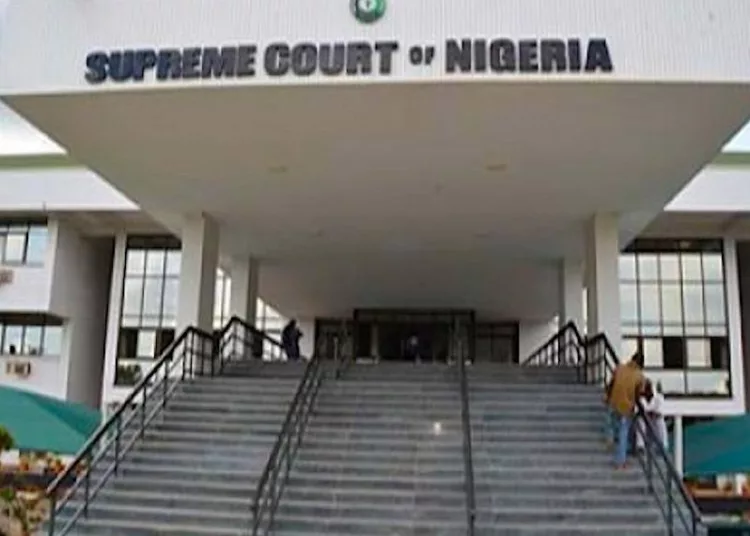A consortium of civil society organisations has called on the Supreme Court to review its judgment in a multi-million dollars contractual dispute between an indigenous company, Owigs and Obigs Nig. Ltd and a commercial bank.
The groups, led by Empowerment for Unemployed Youths Initiative and Independent Public Service Accountability Watch, made the call yesterday at a press conference in Abuja.
In his address, the group’s convener, Stephen Ebira, faulted the apex court’s judgment for being marred by deceitful rulings and misrepresentation of facts contrary to the evidence before the court.
He noted that the said judgment sought to be reviewed, which was in favour of thebank, amounted to a miscarriage of justice as the wrongdoer was declared innocent and rewarded while the victim was held liable.
While stating that the Supreme Court should be a place of hope for the hopeless and not where they are strangulated, the group’s judgment casts a terrible slur on the apex court’s presumed integrity.
“The judgment in appeals no: SC.709/2020 delivered on May 24, 2024, is a broad-day robbery of justice. The Supreme Court should be where justice is birthed, not assassinated and buried.
“It raised a red flag for investors and tarnished the surviving fragment of the nation’s reputation before the international communities and should be quickly reviewed”, the statement reads.
The legal action in question involves a breach of an international commercial contract for the export of solid minerals on a 100% credit basis, with a letter of credit confirmation by the confirming bank as required by the contract’s fundamental credit term.
The main contract, JYOONL-OO1/ KTTA 140415, is a quadrilateral agreement between the buyer, seller, LC issuing bank, and LC confirming bank, comprising four interdependent and interrelated autonomous contracts.
Sadly, the confirming bank (Zenith Bank Plc) was alleged to have maliciously breached the critical fundamental credit term without any reason, activating the contract’s default clause and triggering specific damages without remedy amounting to millions of dollars.
The appellant argues that the apex court, by the said judgment, created a fake irrevocable documentary letter of credit with SWIFT MT 700 without a confirming bank, contradicting the original document and mocking international trade standards.
The false irrevocable documentary letter of credit with SWIFT MT 700 is issued for contract agents and facilitators instead of the buyer-seller contract.
The judgment equally altered the parties to the case by the falsified irrevocable documentary letter of credit, which listed only three parties, excluding the confirming bank/respondent, instead of four.
In the judgment, the Supreme Court rewrote an international contract for the parties in favour of the breaching party by subsisting a non-party with a party, removing the liabilities of the legitimate party to a non-party contrary to the evidence on record and protocol upheld by Uniform Trade Customs and Practice, which ruled and governed the contract—a treaty to which Nigeria is a signatory.
Contrary to evidence on record and serial admissions by the seller’s bank (Zenith Bank PLC), the issuing bank was declared the confirming bank to absolve the confirming bank as the breaching party from its default liabilities.
The appellant said its fundamental right to generate/earn revenue and profits through legitimate business transactions as established by the Federal Republic of Nigeria laws was maliciously breached due to the malicious violation of contract No JYOONL-OO1/KTTA 140415.
The appellant explained that its decision to approach the apex court was not to seek special damages or rights, as misconstrued by the court. Still, instead, it was to enforce the specific remedies outlined in the contract’s default and liability clause, which specifically warned against breach of contract and consequences, including the appellant’s right to generate revenue, which the breaching bank violated under the sales contract.
The appellant’s case is that after securing an export licence to export solid minerals sometime in 2014, Zenith Bank Plc agreed to offer an export finance facility to ensure an export trade contract backed by an acceptable letter of credit from a foreign entity/company.
Following discussions with the bank, the appellant engaged the services of an international agent, Eglone Group Asia Pte Limited, based in Singapore, to help it broker/secure foreign buyers for tin Ore, tantalite ore and columbite ore.
Eglone Group Asia Pte Limited eventually succeeded in getting two buyers for the appellant (Owigs and Obigs Nig. Ltd) in March and April 2014. The first contract that was secured was contract No. Jy-OONL-001, dated March 5, 2014, was executed between the appellant and Guangdong Jiayuan Metals Co. Ltd of China for the supply of Tin ore, while the second contract with contract No. KTTA 140145, dated April 15, 2014, was executed between the appellant and King-Tan Tantalum Industry Ltd of China to supply Columbite and tantalite ore.
However, due to the failure of the appellant (Owigs and Obigs Nig.Ltd) to execute the contract on time, the contracts were cancelled, and Zenith Bank deducted penalty fees from the appellant’s account.





